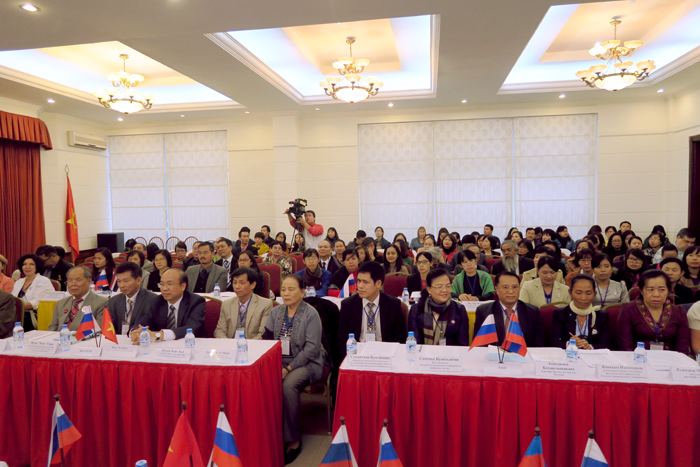International Regional Conference “Russian Language in South-Eastern Countries” was held in Hanoi. Over 200 participants from Vietnam, Cambodia, Laos, Myanmar, Russia and Thailand took part in it. The participants discussed the current situation of the Russian language functioning in the region and shared opinions of how to strengthen its position.
Two-day Conference was held in the capital city of Vietnam Hanoi by the initiative of Rossotrudnichestvo branch office in Vietnam with the support of the International Association of Russian Language and Literature Teachers (MAPRYAL). The event was also supported by Russkiy Mir Foundation, Russian embassy in Vietnam, officials and business representatives of the two countries.

High level of representation at the event should be underlined: Russian delegation included a big amount of leaders and scientists of the leading universities of Moscow, St. Petersburg, Volgograd and Crimea; the head of the delegation was the president of MAPRYAL, president of St. Petersburg State University and president of the Russian Academy of Education L. Verbitskaya. Delegations of other countries also came to Hanoi to take part in the Conference: from Cambodia, Laos, Myanmar and Thailand. Vietnamese Russian Studies was represented by professors and teachers of all the universities and schools of the country, where Russian is taught.
Intercultural communication, role of the Russian language in national educational systems, employment of people with Russian language skills and methods of teaching the Russian language, taking into account language interference factors, which are typical for the countries in question – all of these questions were discussed at the sections in the framework of the Conference. According to the head if Vietnamese Association of Russian Language and Literature Teachers (VAPRYAL) mister Fung Chong Toana, growing interest of Vietnamese young people to studying in Russian is connected with employment opportunities, first of all in tourism. During academic year 2015/16, 795 Vietnamese students were directed to Russian higher education institutions, in 2016/17 this number amounted to 850. But the growth of demand for Russian language is bringing systematic problems like absence of language environment in the target country and lack of modern educational materials. The texts in the materials are to reflect culture-related elements, current aspects of Vietnam-Russia relations and the material should be oriented on overcoming interference typical for native Vietnamese speakers. Textbooks created in Russia are not good for this task and may be used only partially, the head of VAPRYAL said.
The new initiative of the Ministry of Education of Vietnam is opening new prospects for the professional Russianists’ society – they are planning to firmly increase teaching the Russian language at school. Now it is taught from grades 10 to 12 and they are planning to start teaching it from grade 3. Russian and Vietnamese Russianists agreed to design a joint project of national-oriented school textbook. The project is to be implemented in 2017 and its coordinator will be MAPRYAL, which will base upon existent experience of international projects. In 2013–2015, the Association adapted, printed and distributed 23 000 Russian literature textbooks for Russian-speaking schools in Tajikistan.
The question of creating and using national-oriented textbooks was also discussed at round-table discussion “Concept of National-Oriented Textbooks of the New Generation”. Speech of Maiya Nahabina, associate professor of the Moscow State University, one of creators of Russian textbook for foreigners theory, aroused much interest. In her speech, she described the main requirements for the textbooks: additional texts to form vocabulary and to develop a mechanism of language predictability, an opportunity of self-control and self-check. “It would be great, if the text book had a listening part – students may listen to already known texts, when new texts are best for reading”, - underlined M. Nahabina.
Work of other round-table discussions was also vivid and dynamic, where issues of teachers training and export of Russian educational programmes were discussed.
President of MAPRYAL L. Verbitskaya described the situation of Russian language teaching in Vietnam during her final speech at the Conference. According to her, the current level of Russian-Vietnamese cooperation in humanities is not enough – Russian language is only taught in 10 schools of the country according to only one textbook, which was not written by native speakers. Activities of higher education institutions also require support, said Verbitskaya. Programs with Russian language studies are present in 18 higher educational institutions of Vietnam; military engineers, lawyers, doctors, entrepreneurs, economists, teachers of Russian language and literature study Russian. “We see, how fast the local authorities react to social demand – flow of Russian tourists to Vietnam has increased recently and starting from 2016, study programme in Russian language in tourism became available for Vietnamese students”, - noticed Verbitskaya.
The head of MAPRYAL gave a high rating to the activities of Vietnamese higher education institutions, which have become a kind of “competence centres” of the Russian language. These institutions are Institute of Foreign Languages under Hanoi State University, Hanoi Law Institute and Institute of Foreign Trade, Military Technical Academy, Academy of Air Defense of Vietnam Military Air Force, Academy of People’s Public Defense and People Police Academy.
Conference materials are available on MAPRYAL
web-site.








